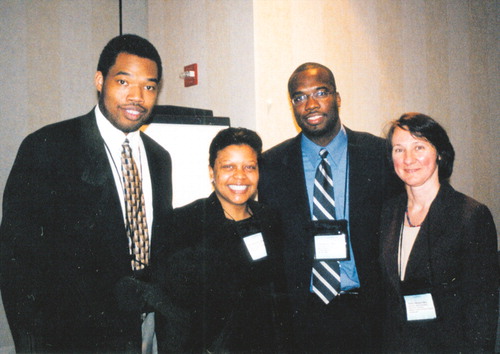Curriculum Aims to Improve MH Care of African Americans
Educating residents and faculty about the cultural issues, strengths, and mental health risk factors shared by diverse groups of African Americans is necessary to ensure quality psychiatric care for African-American patients.
This was the message presented at a workshop titled “Designing an African-American Curriculum From the Inside Out” that was held at the meeting of the American Association of Directors of Psychiatric Residency Training in New Orleans last month.
 “The majority of psychiatrists treating African-American patients are not from the same ethnic group or culture, and that is why training in this area is so important,” said Timothy Benson, M.D., chief resident in substance abuse at the Massachusetts General Hospital (MGH)/McLean residency program in adult psychiatry.
“The majority of psychiatrists treating African-American patients are not from the same ethnic group or culture, and that is why training in this area is so important,” said Timothy Benson, M.D., chief resident in substance abuse at the Massachusetts General Hospital (MGH)/McLean residency program in adult psychiatry.
Benson, along with colleagues Marketa Wills, M.D., chief resident in international and public psychiatry at the MGH/McLean program, and Anthony Chambers, Ph.D., a clinical fellow in psychology at the MGH psychology internship program, are developing a model curriculum to help psychiatrists in training and faculty provide more effective treatment to African-American patients.
Benson pointed out that African-American patients have historically received short shrift where psychiatric treatment is concerned.
African Americans, he said, are at an elevated risk for developing mental illness, compared with other ethnic groups, due in part to high rates of poverty and exposure to violence.
However, African Americans may be more hesitant to seek care due to a pronounced—and well-founded—mistrust of the mental health system due to “clinician bias and stereotyping, which have impacted the type and quality and care provided to African Americans,” he said.
For instance, several studies show that African-American patients are overdiagnosed with psychotic disorders such as schizophrenia and underdiagnosed with mood and anxiety disorders, Benson pointed out.
He also cited research showing that when compared with white youth, African-American youth are four times as likely to be restrained during a bout of aggressive behavior.
Benson and his colleagues have some help in devising a model curriculum—in 2001, members of APA’s Committee of Black Psychiatrists created a template for instructing psychiatry residents on the treatment of African-American patients.
Crucial elements of the curriculum include an exploration of the heritage of African Americans, according to Wills. The legacy of the “middle passage, in which African youth were trapped, abducted, and packed as cargo in ships, is still a part of the identity of black youth today,” she said.
The curriculum is also designed to help residents become more aware of the heterogeneity of African Americans as a group—there are substantial differences in socioeconomic status, skin color, sexual orientation, and language that must be taken into account when treating these patients.
Other learning objectives include understanding the impact of belief systems and acculturation on the impact of the therapeutic relationship and identifying issues and conflicts within the trainee’s own culture, Wills said.
In addition, training on diagnosis and treatment issues as they pertain to African-American patients is included in the committee’s recommendations. “African-American women who are depressed may display an increased level of irritability, which might be considered normal in terms of their cultural sterotypes, but for that patient, it may be a sign of mood decompensation,” Wills said.
The need for a curriculum dealing with the treatment of African-American patients is clear, but some residency training directors and faculty may be reluctant to teach the subject, according to Chambers.
Chambers cited the results of a survey conducted among a small sample of black psychiatrists at the 2003 meeting of the Black Psychiatrists of America.
Respondents, when asked about why they thought people may be resistant to implementing such a curriculum, replied that many psychiatry supervisors lack an awareness of cultural issues and also that there may be a lack of motivation because “teaching cultural sensitivity is not linked to licensure or accreditation,” Chambers said.
In addition, survey respondents speculated that supervisors may be afraid to offend residents in discussions of issues having to do with race and ethnicity. “Political correctness has taken the dialogue away,” Chambers observed.
Kathy Sanders, M.D., residency training director at the MGH/McLean adult psychiatry program, is working with Benson, Wills, and Chambers to incorporate training on African-American mental health issues into a broader sociocultural curriculum.
Many of their recommendations will be presented in a daylong seminar on May 7 in Boston.
The seminar will cover subjects such as ethnopsychopharmacology, African-American family structure, historical perspectives on African-American culture, and topics such as substance abuse and forensic psychiatry in the context of African-American culture. ▪



